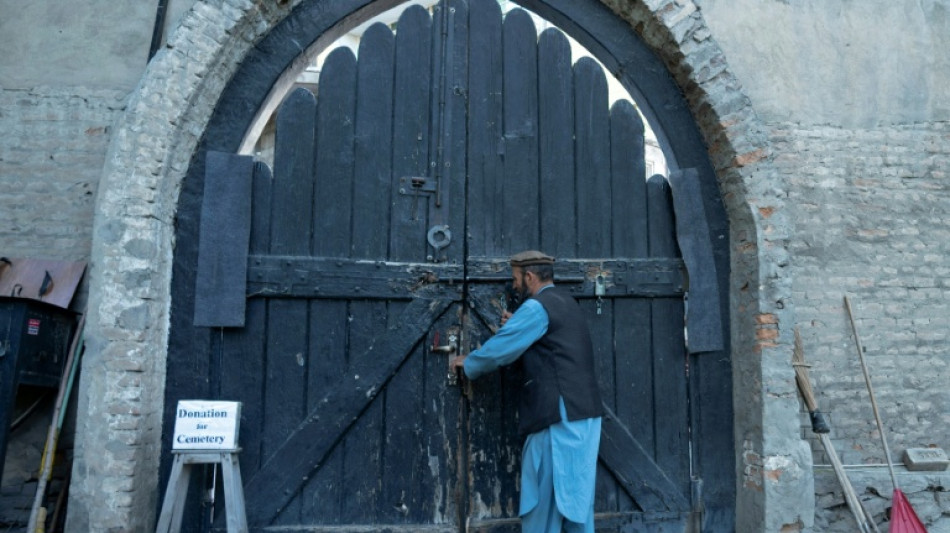
-
 M23, DR Congo sign new peace roadmap in Doha
M23, DR Congo sign new peace roadmap in Doha
-
Estevao, Casemiro on target for Brazil in Senegal win

-
 Ford steers England to rare win over New Zealand
Ford steers England to rare win over New Zealand
-
Massive march in Brazil marks first big UN climate protest in years

-
 Spain rescues hundreds of exotic animals from unlicensed shelter
Spain rescues hundreds of exotic animals from unlicensed shelter
-
Huge fire sparked by explosions near Argentine capital 'contained'

-
 South Africa defy early red card to beat battling Italy
South Africa defy early red card to beat battling Italy
-
Sinner beats De Minaur to reach ATP Finals title match

-
 Zelensky vows overhaul of Ukraine's scandal-hit energy firms
Zelensky vows overhaul of Ukraine's scandal-hit energy firms
-
South Africa defy early red card to beat Italy

-
 Alex Marquez claims Valencia MotoGP sprint victory
Alex Marquez claims Valencia MotoGP sprint victory
-
McIlroy shares lead with Race to Dubai title in sight

-
 Climate protesters rally in Brazil at COP30 halfway mark
Climate protesters rally in Brazil at COP30 halfway mark
-
Spike Lee gifts pope Knicks jersey as pontiff meets film stars

-
 BBC caught in crossfire of polarised political and media landscape
BBC caught in crossfire of polarised political and media landscape
-
'Happy' Shiffrin dominates in Levi slalom for 102nd World Cup win

-
 Palestinian national team on 'mission' for peace in Spain visit
Palestinian national team on 'mission' for peace in Spain visit
-
Brazilian 'Superman' cheers child cancer patients in Ghana

-
 India close in on win over South Africa after Jadeja heroics
India close in on win over South Africa after Jadeja heroics
-
Huge explosions rock industrial area near Argentina's capital

-
 Bezzecchi takes pole for Valencia sprint and MotoGP
Bezzecchi takes pole for Valencia sprint and MotoGP
-
Dominant Shiffrin leads after first slalom run in Levi

-
 Nine killed in accidental explosion at Indian Kashmir police station
Nine killed in accidental explosion at Indian Kashmir police station
-
Climate protesters to rally at COP30's halfway mark

-
 Fighting South Africa lose Rickelton after India 189 all out
Fighting South Africa lose Rickelton after India 189 all out
-
Harmer leads South Africa fightback as India 189 all out

-
 Prison looms for Brazil's Bolsonaro after court rejects his appeal
Prison looms for Brazil's Bolsonaro after court rejects his appeal
-
EU bows to pressure on loosening AI, privacy rules

-
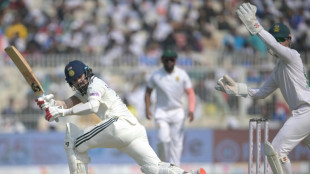 India close in on lead despite South African strikes
India close in on lead despite South African strikes
-
Curry's 49 points propel Warriors in 109-108 win over Spurs

-
 NZ boxer Parker denies taking banned substance after failed test
NZ boxer Parker denies taking banned substance after failed test
-
Australia setback as Hazlewood ruled out of 1st Ashes Test

-
 Australia pace spearhead Josh Hazlewood ruled out of 1st Ashes Test
Australia pace spearhead Josh Hazlewood ruled out of 1st Ashes Test
-
UN Security Council to vote Monday on Trump Gaza plan
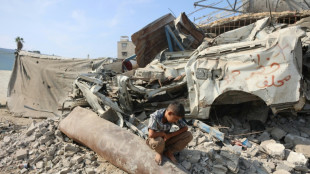
-
 Japan's Tomono leads after men's short program at Skate America
Japan's Tomono leads after men's short program at Skate America
-
China tells citizens to avoid Japan travel as Taiwan row grows
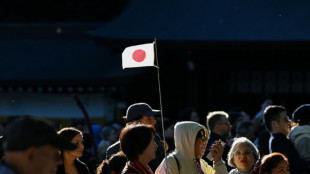
-
 Purdue Pharma to be dissolved as US judge says to approve bankruptcy
Purdue Pharma to be dissolved as US judge says to approve bankruptcy
-
Iran's first woman orchestra conductor inspires

-
 Wood gets all-clear in boost for England
Wood gets all-clear in boost for England
-
Golf's world No. 8 Thomas has back surgery

-
 Rebooted Harlem museum celebrates rise of Black art
Rebooted Harlem museum celebrates rise of Black art
-
'Desperation in the air': immigrant comics skewer Trump crackdown

-
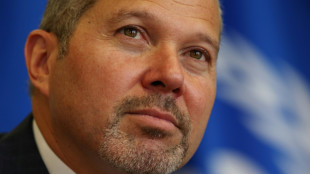 UN regulator says shipping still wants to decarbonize -- despite US threats
UN regulator says shipping still wants to decarbonize -- despite US threats
-
Grant, Kim share halfway lead in LPGA Annika tournament

-
 Musk's Grokipedia leans on 'questionable' sources, study says
Musk's Grokipedia leans on 'questionable' sources, study says
-
Trump signs order to lower tariffs on beef, coffee, other goods

-
 Croatia qualify for 2026 World Cup, Netherlands close, Germany in limbo
Croatia qualify for 2026 World Cup, Netherlands close, Germany in limbo
-
'Last Chance U' coach dies after shooting: US police

-
 Sinner completes perfect ATP Finals group stage, Auger-Aliassime reaches last four
Sinner completes perfect ATP Finals group stage, Auger-Aliassime reaches last four
-
Woltemade sends Germany past Luxembourg in World Cup qualifier


Nearly two centuries on, quiet settles on Afghanistan's British Cemetery
Aynullah Rahimi's family has for decades tended the old cemetery in Kabul reserved for non-Afghans, but since the country's latest war ended and foreigners left in droves, he says few now enter the oasis of quiet in the capital.
Dating back to the Anglo-Afghan wars of the 19th century, the small plot of land in the city centre has interred and memorialised foreign fighters, explorers and devotees of Afghanistan who have died in the country over some 180 years.
In the two decades of war between Western forces and the Taliban that ended in 2021 with the latter's victory, there were a handful of burials and memorials attended by ambassadors and dignitaries at the British Cemetery.
But these days, Rahimi quietly tends to the garden of roses and apricot trees, the calls of caged partridges louder than the rumbling traffic beyond the high stone wall that secludes the cemetery.
"Before the Taliban came to power, many foreigners used to come here to visit every week," he told AFP.
"No one visits here much now, only sometimes a few tourists," he said.
The paint on the walls -- hung with commemorative plaques for the dead of NATO countries who fought the Taliban, as well as journalists who covered the conflict -- has chipped and weathered since the Taliban takeover in 2021, when Western embassies emptied.
Where Kabul was once teeming with Western soldiers, diplomats, journalists and humanitarians, their presence has thinned dramatically.
Adventurers from around the world are increasingly travelling to the country, despite lingering security risks and Taliban-imposed restrictions primarily targeting Afghan women -- including a general ban on women entering Kabul's parks.
For those who know what's behind the wall marked only by a small sign reading "British Cemetery", they can pause in the shade in one of the few green spaces in the city fully open to foreign women.
"This is a historical place," Rahimi said, noting he hasn't had interference by the Taliban authorities.
Those whose countrymen are memorialised there are welcome, he added -- "it's their graveyard".
- The Ritchies -
The last time the cemetery was full of the living, Rahimi said, was the burial of the latest person to be interred there -- Winifred Zoe Ritchie, who died in 2019 at the age of 99.
Ritchie's family brought her body from the United States to Afghanistan to be laid to rest next to her husband, Dwight, who was killed in a car crash in southern Afghanistan 40 years earlier.
The Ritchies had worked and lived in Afghanistan, one of their sons later following in their footsteps -- cementing the family's ties to a country far from their homeland.
The couple's daughter, Joanna Ginter, has memories of her family wandering through markets, flying kites and raising pigeons in Kabul years before the city was engulfed by the first of many conflicts that wracked the country for 40 years.
Their mother's burial "was the first time (we visited) since we were there for my dad's funeral", Ginter told AFP, having travelled back to Kabul with relatives.
"I was very happy to get to go there, even though it was for a funeral."
Her mother's grave marker stands out in light marble among the headstones, wobbly letters next to a long cross -- a rare sight in Afghanistan.
Older gravestones of some of the more than 150 people buried there bear the scars of conflict, names pockmarked into near unrecognisability by weapon fire that breached the wall.
Other than thieves who broke through a fence where the cemetery backs onto a hill dotted with Muslim graves -- "our graveyard", Rahimi calls it -- the caretaker says he is left mostly alone to his watch.
The 56-year-old grew up helping his uncle who raised him tend to the cemetery, taking over its care from his cousin who fled to Britain during the chaotic withdrawal of foreign forces as the Taliban marched into Kabul.
He had in turn taken up the post from his father, who guarded the cemetery and dug some of its graves for around 30 years.
"They also told me to go to England with them, but I refused and said I would stay here, and I have been here ever since," Rahimi said, certain one of his sons would follow in his footsteps.
N.Shalabi--SF-PST


